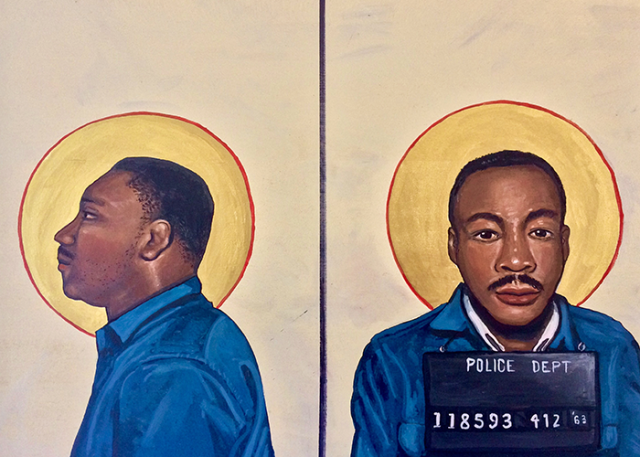Five Ways Into Sunday’s Scripture: Remembering the Rev. Dr. Martin Luther King, Jr.

Jesus said, “I say to you that listen: Love your enemies, do good to those who hate you, bless those who curse you, pray for those who abuse you. If anyone strikes you on the cheek, offer the other also; and from anyone who takes away your coat do not withhold even your shirt. Give to everyone who begs from you; and if anyone takes away your goods, do not ask for them again. Do to others as you would have them do to you. “If you love those who love you, what credit is that to you? For even sinners love those who love them. If you do good to those who do good to you, what credit is that to you? For even sinners do the same. If you lend to those from whom you hope to receive, what credit is that to you? Even sinners lend to sinners, to receive as much again. But love your enemies, do good, and lend, expecting nothing in return. Your reward will be great, and you will be children of the Most High; for he is kind to the ungrateful and the wicked. Be merciful, just as your Father is merciful.”
Luke 6:27–36
This Sunday, we remember the life and legacy of the Rev. Dr. Martin Luther King, Jr., the great civil rights leader. What is often neglected in our national remembrance is that Dr. King was first, and foremost, a Christian. As a follower of Christ, particularly the Christ we meet in today’s Gospel, King was committed to nonviolence as a manifestation of loving one’s enemies and the creation of “the Beloved Community,” where all people have what they need to thrive. It was because of his faith that he was able to stay the course in the face of death threats and harassment, embodying the teaching Jesus offers in the Gospel of Luke.
The civil rights movement sought to change systemic injustice. While successful in many respects, the work is far from finished. Our nation still faces poverty, poor education, mass incarceration, a housing crisis, poor health care, and threats to the right to vote — and these injustices disproportionately affect people of color.
King took Jesus’s countercultural teaching from Luke’s Gospel to heart and lived it in action. What we think of as “our” comforts, “our” opportunities and benefits, are not ours when they rest on systems that keep our neighbors oppressed and in need. As disciples of Jesus, he calls us to “do to others as you would have them do to you,” which means we are responsible for each other’s well-being. As King wrote in his Letter from Birmingham Jail, “Injustice anywhere is a threat to justice everywhere.”
—Ruth Frey
SOCIAL JUSTICE
King’s philosophy of nonviolence is at the heart of the civil rights movement. There is so much to learn from this philosophy, including, “Nonviolence Seeks to Defeat Injustice, or Evil, Not People,” and “Nonviolence Chooses Love Instead of Hate.” What would our world look like if we could follow just these two principles?
THEOLOGY
Remaining Awake through a Great Revolution is one of the last sermons King gave before he was killed. It has much to offer us today.
POETRY
Gwendolyn Brooks (1917–2000) wrote this poem in 1968 following the assassination of Dr. Martin Luther King, Jr.
MUSIC
I think the song “Let God Lead” by Jon Batiste captures how King lived his life. Here are the lyrics.
VISUAL ART
Icon writer Kelly Latimore depicts King being processed during his many arrests for civil disobedience. (Image shared with permission).
Coming Soon
Sunday, January 15 | 11:15am
MLK Sunday Guest Preacher
This Sunday, join us as we remember the life and legacy of the Rev. Dr. Martin Luther King, Jr., and hear from guest preacher the Rev. Kevin W. VanHook, II, Executive Director of Episcopal Charities of the Diocese of New York.
Sundays through January 29 | 10am
Discovery: God, Love, Eros, and Incarnation
The Song of Songs gives a blueprint for love and companionship. See how poets and artists and the writer’s contemporaries explored relationships in this Scripture. This week, join the Rev. Elizabeth Blunt to discuss Love in the Hebrew Bible and the Song of Songs.






